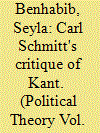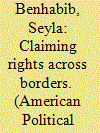| Srl | Item |
| 1 |
ID:
115733


|
|
|
|
|
| Publication |
2012.
|
| Summary/Abstract |
Carl Schmitt's critique of liberalism has gained increasing influence in the last few decades. This article focuses on Schmitt's analysis of international law in The Nomos of the Earth, in order to uncover the reasons for his appeal as a critic not only of liberalism but of American hegemonic aspirations as well. Schmitt saw the international legal order that developed after World War I, and particularly the "criminalization of aggressive war," as a smokescreen to hide U.S. aspirations to world dominance. By focusing on Schmitt's critique of Kant's concept of the "unjust enemy," the article shows the limits of Schmitt's views and concludes that Schmitt, as well as left critics of U.S. hegemony, misconstrue the relation between international law and democratic sovereignty as a model of top-down domination. As conflictual as the relationship between international norms and democratic sovereignty can be at times, this needs to be interpreted as one of mediation and not domination.
|
|
|
|
|
|
|
|
|
|
|
|
|
|
|
|
| 2 |
ID:
093228


|
|
|
|
|
| Publication |
2009.
|
| Summary/Abstract |
The status of international law and transnational legal agreements with respect to the sovereignty claims of liberal democracies has become a highly contentious theoretical and political issue. Although recent European discussions focus on global constitutionalism, there is increasing reticence on the part of many that prospects of a world constitution are neither desirable nor salutary. This article more closely considers criticisms of these legal transformations by distinguishing the nationalist from democratic sovereigntiste positions, and both, from diagnoses that see the universalization of human rights norms either as the Trojan horse of a global empire or as neocolonialist intentions to assert imperial control over the world. These critics ignore "the jurisgenerativity of law." Although democratic sovereigntistes are wrong in minimizing how human rights norms improve democratic self-rule; global constitutionalists are also wrong in minimizing the extent to which cosmopolitan norms require local contextualization, interpretation, and vernacularization by self-governing peoples.
|
|
|
|
|
|
|
|
|
|
|
|
|
|
|
|